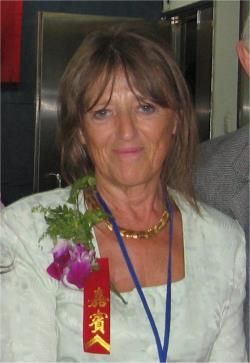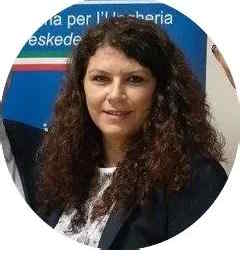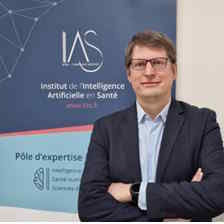Synergy Human-AI for complex problem-solving
IFIP and University of Reims
Session 231
The objective of this session is to discuss the balance between "AI everywhere" and wise combination of human and artificial intelligences in the context of triple transformation.
The current trend in applying the last generation AI techniques everywhere and utilising the same approach for solving every kind of problems leads to increase pollution and cognitive decline of humans. The panelists will discuss the human-AI synergy necessary for more appropriate decision making and minimizing the impact on our environment.

Gregory is a Global Accounts & Expanded Assurance Markets Program Director with expertise in ESG, Data & AI, IT Systems, Cybersecurity, and BEPS 2.0. He drives the development of new solutions and go-to-market campaigns, particularly through global accounts. With a successful track record in leading global innovation projects and understanding the impact of disruptive technologies, Gregory excels in articulating thought leadership on emerging technologies. He brings extensive marketing and digital transformation experience, aligning service lines, delivering integrated client programs, and implementing revenue campaigns. With 20 years of international experience in industries such as technology, media, telecommunications, utilities, and professional services, Gregory holds a master's degree in Engineering specializing in Information Technology and Artificial Intelligence, as well as a bachelor's degree in Engineering focused on Electronic and Computer engineering.

Eunika Mercier-Laurent is electronic engineer, PhD in computer science, expert in artificial intelligence, associate researcher with University of Reims Champagne Ardennes and Professor at EPITA International Programs.
She chairs IFIP Technical Committee on Artificial Intelligence.
Her teaching and MOOC includes Knowledge Management & Innovation powered by AI, Neuro-symbolic AI, Ethical Development of AI Systems and Innovation Ecosystems.
After working as researcher in INRIA, computers designer and manager of innovative AI applications with Groupe Bull, she founded Global Innovation Strategies devoted to all aspects of Knowledge Innovation powered by AI.
Among her research topics are: Knowledge and Eco-innovation Management Systems, AI methods and techniques for innovation, knowledge modelling and processing, complex problem solving, AI for sustainability, eco-design and impacts of artificial intelligence.
She is President of Innovation3D, International Association for Global Innovation, expert for EU programs, member of Managing Body of the EU K4I (https://www.knowledge4innovation.eu) and author of over hundred scientific publications and books. Among the last “The Innovation Biosphere, Planet and Brains in Digital Era”, “Intelligence in Energy” with G. Kayakutlu and “World Class Cooking for Solving Global Challenges” with L. Edvinsson.

Anne Dourgnon holds an engineering degree in Applied mathematics and Computer Science from ENSEEIHT (France).
She is currently an expert in Symbolic Artificial Intelligence and Systems Engineering at EDF (Electricity Of France) R&D
For several years, she was deputy convenor of Expert Group TC 184/SC4/ISO 8000 “Industrial Data Quality”.
Previously she was with AI Department of Bull Computer Company, where she acquired a great experience in applying AI techniques for solving "real world" problems (AI Department of Bull Computer Company). She also elaborated a method for developing AI systems.
She has published some thirty scientific articles on symbolic AI and IS, on subjects as varied as expert systems in mechanics and the meaning of IIOT names.

Cristina Monsone is engineer with a passion for innovation and artificial intelligence.
She is deeply engaged in research. Currently, she explores the fascinating realms of AI applications, Digital Twin technology, and robotics at Szechenyi Istvan University in Hungary.
She has been worked as a consultant for both private and public companies across Europe. She serves as an independent expert for the European Commission (FP7/H2020/EIT/HORIZON EUROPE), the German Aerospace Center (DLR) in collaboration with Eranetmed and Eranetmed Russia + programs, and the Eureka Network.
She supports business development endeavors through cutting-edge technologies, fostering the adoption of sustainable solutions and contributing to building a resilient and forward-interactive thinking community.

Vincent Vuiblet, MD, PhD, stands at the forefront of the evolving intersection of medicine and technology. With a Doctorate in Medicine specializing in Nephrology and Renal Pathology from the University of Reims Champagne-Ardenne (URCA) where he now serves as Professor of Medicine. Pr. Vuiblet has cultivated a substantial clinical and academic career. His expertise in renal pathology and nephrology, backed by a PhD in Health Technology, positions him as a distinguished figure in his field.
In the realm of clinical hospital activities at CHU Reims, Vincent Vuiblet stands out through his multifaceted and pivotal roles. As the Head of Renal Transplantation Activity from Living Donors, he orchestrates the intricate procedures and patient care that this complexoperation entails. His expertise extends to leading the Renal Pathology Activity, where his profound knowledge in kidney diseases guides accurate diagnoses and shapes personalized treatment strategies. Moreover, his role as a Practitioner in Nephrology epitomizes his commitment to the field, as he engages in the comprehensive care and treatment of patients facing various renal conditions. Vincent Vuiblet's contributions to CHU Reims underscore his versatile expertise and his dedication to patient care in a dynamic clinical environment.
Beyond his clinical acumen, Pr. Vuiblet is the Director of the Institute of Artificial Intelligence in Health (iias.fr), reflecting his commitment to integrating AI into healthcare to enhance patient outcomes. His skills in machine learning, deep learning, and health data science are not just theoretical but applied in his role as medical practitioner at Reims University Hospital.
Pr. Vuiblet's national responsibilities further underscore his leadership, including his presidency of the National Scientific Federation of Health Data (FNSDS) and coordination roles in health data networks. His work in digital innovation and health data management at the local level aligns with his strategic positions at the Faculty of Medicine and CHU of Reims, and in Reims University.
His educational contributions are equally noteworthy, directing training programs in digital health and co-directing a Master's Degree in AI for Health. Pr. Vuiblet's teaching spans nephrology to immunology, reflecting his multidisciplinary expertise.
In research, at the head of the Institute of AI in Health, Pr. Vuiblet's leadership in securing national and regional grants for health data projects showcases his vision for future healthcare. His stewardship of the EDEN4Health (€20M) and HealthData4Care (€8.5M) projects, among others (€10M), speaks to his ability to spearhead significant advancements in medical data utilization.
-
 C3. Access to information and knowledge
C3. Access to information and knowledge
-
 C4. Capacity building
C4. Capacity building
-
 C6. Enabling environment
C6. Enabling environment
-
 C7. ICT applications: benefits in all aspects of life — E-business
C7. ICT applications: benefits in all aspects of life — E-business
-
 C7. ICT applications: benefits in all aspects of life — E-health
C7. ICT applications: benefits in all aspects of life — E-health
-
 C7. ICT applications: benefits in all aspects of life — E-environment
C7. ICT applications: benefits in all aspects of life — E-environment
-
 C10. Ethical dimensions of the Information Society
C10. Ethical dimensions of the Information Society
-
 Goal 3: Ensure healthy lives and promote well-being for all
Goal 3: Ensure healthy lives and promote well-being for all
-
 Goal 4: Ensure inclusive and equitable quality education and promote lifelong learning opportunities for all
Goal 4: Ensure inclusive and equitable quality education and promote lifelong learning opportunities for all
-
 Goal 7: Ensure access to affordable, reliable, sustainable and modern energy for all
Goal 7: Ensure access to affordable, reliable, sustainable and modern energy for all
-
 Goal 8: Promote inclusive and sustainable economic growth, employment and decent work for all
Goal 8: Promote inclusive and sustainable economic growth, employment and decent work for all
-
 Goal 9: Build resilient infrastructure, promote sustainable industrialization and foster innovation
Goal 9: Build resilient infrastructure, promote sustainable industrialization and foster innovation
-
 Goal 12: Ensure sustainable consumption and production patterns
Goal 12: Ensure sustainable consumption and production patterns
-
 Goal 13: Take urgent action to combat climate change and its impacts
Goal 13: Take urgent action to combat climate change and its impacts
-
 Goal 17: Revitalize the global partnership for sustainable development
Goal 17: Revitalize the global partnership for sustainable development
AI has the potential to wisely support the sustainability in all fields at the condition to cambine the human knowledge and experience with the suited AI techniques. The most important is to influence the wise business.